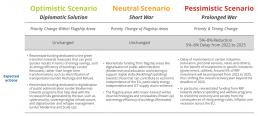How the Russia-Ukraine war is expected to impact Next-Gen EU funding
The tragic war in Ukraine is impacting the European Union in several ways: it has a societal impact due to the largest and fastest inflow of refugees since World War II; an economic impact due to energy price increases and disruption to the agri-food supply chain; and a political impact created by the support that European governments are providing to Ukraine’s military resistance. This blog analyses the possible consequences of the war for European COVID-19 recovery plans.
A Brief Reminder About RRF
The EU Recovery and Resilience Facility makes available €672.5 billion in loans and grants to support reforms and investments undertaken by EU countries to recover from the COVID-19 crisis. National governments including France, Germany, Italy, and the UK have made available their own national funding, adding to the EU facility.
European countries have designed their recovery plans to mitigate the short-term shock of the pandemic and exploit the opportunity to roll out reforms and investments that will make the recovery sustainable in the long-term. The Facility is structured around six pillars: green transition; digital transformation; smart, sustainable and inclusive growth; social and territorial cohesion; health, economic, social and institutional resilience; policies for the next generation.
Information and communication technologies will play a vital role to enhance the resilience of critical services, make access to digital services and resources more inclusive, and leverage data to make evidence-based strategic and operational decisions. Green transition and digital transformation are expected to have a major impact on ICT investment. ICT Investments will move along key flagship areas highlighted by the RRF: POWER UP, CONNECT, MODERNISE, RENOVATE, RECHARGE AND REFUEL, SCALE UP, and RESKILL AND UPSKILL.
The Impact of the Ukraine War on RRF
The social, economic, and political impacts of the Russia-Ukraine war are expected to shift recovery and resilience plan priorities. The shift will depend on how the war evolves. IDC foresees three possible scenarios.
- Scenario 1. A diplomatic solution is reached within three months — In this scenario, IDC expects that the overall amount of RRF will remain the same, while funding will be reallocated within flagship areas. For instance, in the MODERNISE flagship area public administrations may shift funding towards digital capabilities for refugee management, such as issuing digital identities and scaling digital services to give Ukrainian refugees access to schooling, housing and healthcare. Moreover, in the RENOVATE area, countries may prioritise measures for energy savings in the short term to address potential energy supply shortages, instead of focusing on longer term investments on infrastructural enhancements.
- Scenario 2. A short war that lasts less than 12 months — In this scenario, IDC expects that the overall amount of RRF will remain the same, but funding will be re-allocated across flagship areas, considering a priority shift. For instance, we expect that flagship areas, such as POWER UP and RENOVATE, which will contribute to reducing the EU’s energy dependence on Russian commodities, will receive more funding at the expense of areas like MODERNISE and RESKILL AND UPSKILL.
- Scenario 3. A prolonged war that lasts more than 12 months — In this scenario, IDC expects EU member states to reduce the overall amount of money dedicated to RRF by 5% to 8% and postpone an additional 5% to 8% beyond the 2026 deadline. This reduction will be driven by the EU-wide political commitment to increase military spending from 1.5% to 2% of GDP and the need to shield the economy from the consequences of high energy costs, shortages and inflation in agri-foods and other products, and recession.
Focus on Resilience
The expected changes described above indicate a shift towards measures that can help increase European resilience to energy, digital, economic, and military shocks, over measures dedicated to long-term reforms. In some cases, the two will overlap, however, such as the shift to renewable energy resources, which will both reduce dependence on commodities such as oil and gas, and tackle climate change.
“To handle the wider impact of the war against Ukraine, we need to bolster European economic resilience, end our energy dependence on Russia, and further strengthen European defence” said Josep Borrell, High Representative of the European Union for Foreign Affairs and Security Policy/Vice-President of the European Commission.
To face this situation, European CIOs and technology suppliers must increase their own resilience to be prepared for these changes in recovery and resilience plans.
Our analysts will continue to monitor the situation and we will continue to publish new research into the overall consequences of the war on the ICT market and on the RRF.
To learn more about our upcoming research, please contact Carla La Croce or Max Claps, or head over to https://www.idc.com/eu and drop your details in the form on the top right.




